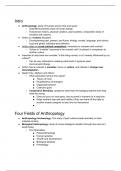Intro
●Anthropology: study of humans across time and space
○Scientific/humanistic study of human beings
○Evolutionary history, physical variation, past societies, comparative study of societies and cultures
●Anthro is a holistic discipline
○Encompassing past, present, and future; biology, society, language, and culture; local and global; individual and collective
●Anthro relies on cross-cultural comparison : necessary to compare and contrast
○Culture is “invisible” (assumed to be normal) until it is placed in comparison to another culture
●Important to step back and consider “is this thing normal, or is it heavily influenced by my
culture?”
○Can be very influential in realizing what kinds of systems need improvement/change
●Anthro has an interest in societies, focus on culture, and interest in change over time/adaptation
●Sarah Hrdy, Mothers and Others
○What separates humans from apes?
■Theory of mind
■Empathy/trust of strangers
■Organized behavior
■Collective good
○Cooperative Breeding: caregivers other than the biological parents who help raise the young
■Does not occur in most apes, has occurred in humans for a long time
■Helps mothers stay safe and healthy if they can hand off the baby to another trusted caregiver to take time for themselves
■
Four Fields of Anthropology
●Anthropology Archaeology: The study of past cultures based primarily on their material remains
●Biological Anthropology: study of human biological variation through time and as it exists today
○Five Specialties:
■Paleoanthropology
■Human genetics
■Growth and development
■Biological plasticity
■Primatology ●Linguistic Anthropology: study of language and linguistic diversity; study of language and its relation to culture
●Cultural Anthropology: cross-cultural study of human society and culture
○Describes, analyzes, interprets, explains sociocultural similarities/differences
○Ethnography: fieldwork and its written results
○Ethnology: attempt to find general principles or laws that govern cultural phenomena through the comparison of cultures
Method and Theory in Cultural Anthro
●Unilinear Evolution: idea of a single line or path of cultural development
○Societies went from savage → barbarian → civilized
■Progress in technological sophistication, morality
■Became the justification for colonialism
●“More advanced” societies helping “savage” societies improve
○Old concept – inherently racist
Eugenics, Cephalic Index, and Craniology
●Eugenics: idea that humans should “select” for the best traits when reproducing
○Some people (ie minorities) were understood to have lower IQ/higher affinity for crime → suggested to not reproduce
●Cephalic Index/Craniology: intelligence and degree of morality could be deduced through head size/structure
●Franz Boas: introduced idea of historical particularism (histories are not comparable, diverse paths can lead to the same result)
○Strongly against eugenics movement
■Biology does not determine cultural achievement
○Lived alongside Inuit community in field work
■Argued that anthropologists should live among the people they’re studying
●Bronislaw Malinowski: long term fieldwork with Trobriand islanders
○Landed right as WWI started and got stuck there → realized that long-
term fieldwork, living and participating with community is beneficial to study
●3 tasks of ethnographers (Malinowski):
○Skeleton
■Structure of a society
■Laws, government, social organization, ceremonies/traditions
○Flesh and blood
■Intimate touches of daily life
■Everyday social fabric
○Spirit
■Native viewpoints and ideals ■Typical ways of thinking and feeling
Fieldwork Methods
●Building rapport: friendly working relationship w hosts based upon personal contact
○Learn language, develop trust
●Participant Observation: actively participating in daily life and social events, observing/describing/taking notes/analyzing what one sees
●Key Informants/Respondents: People who are active in welcoming/helping, experts/more knowledgeable about certain aspects of life
●Interviews including formal, unstructured, (un)recorded, semiformal, etc
*Culture*
●Emic: research strategy focusing on local explanations and meanings
●Etic: research strategy emphasizing ethnographer explanations and categories
●Need both strategies to have full understanding
Fieldwork
●Preliminary fieldwork
○Proposal: Why are you interested? Why does it matter? What research is already
done?
○Site selection
○Find contacts
●Grant proposal and defense (in academia)
●Apply for funding
●Rejections :(
●Funding! :)
●Consider ethical problems, secure IRB approval
○IRB = Institutional Review Board
●Make affiliation with institution in host country
●Apply for required visas, etc
●Secure housing in location of interest
●Apply for housing
●Do research, collect data
●Analyze data, write up research
○Articles
○Dissertation/book
●Present research
○Conferences
○Classes Commitments
●During fieldwork, anthropologists develop obligations to and become representative of many groups
●Obligations:
○People they’re studying
○Officials/institutions in host nations
●Representative:
○Academic institution
○Nation
○Other academics in your field
○Yourself
Ethics in Fieldwork
●Do no harm
●Protecting identity of consultants
○Small villages where everyone knows each other → still must be anonymous
●How to obtain informed consent and proper permission from gov/institutions
●How to avoid damaging own reputation or reputation of anthro as a whole
●Consequences of publications
●Sensitive to beliefs, traditions, etc of local community
●Any particular vulnerabilities of the population
Culture
●Culture: systems of human behavior and thought
○Traditions/customs transmitted thru learning (not bio inheritance)
○Form and guide beliefs and behavior
○Learned behavior/symbols that allow ppl to live in groups
●Fulfills biological needs
●Patterns our thoughts/perceptions
○Understandings of time/space
●Essentialism: invariable + fixed properties which define the whatness of a given entity
○When culture is written down and becomes a fixed, generalized thing
○Ex: All UMich students love football and are in Greek life and just drink all the time
Culture is Learned
●Enculturation: process by which culture is learned and transmitted across generations
●We are capable of learning any culture
●Learn through teaching, observation, and messing up




